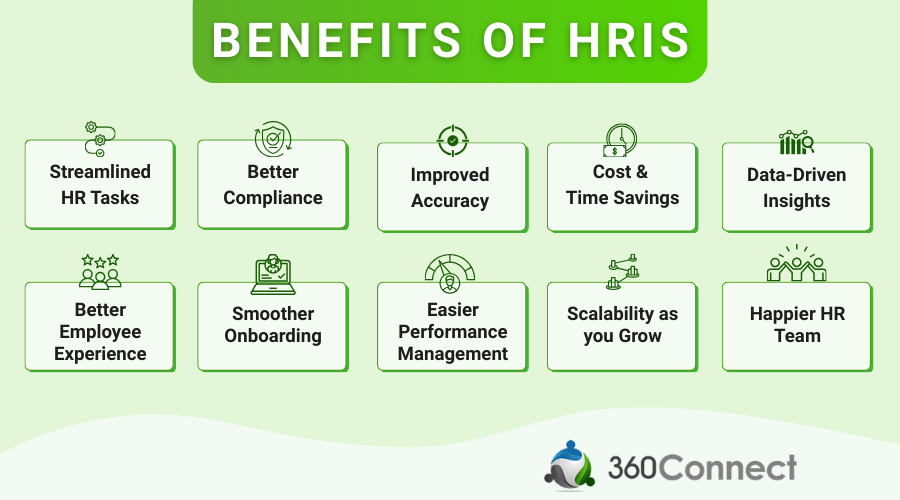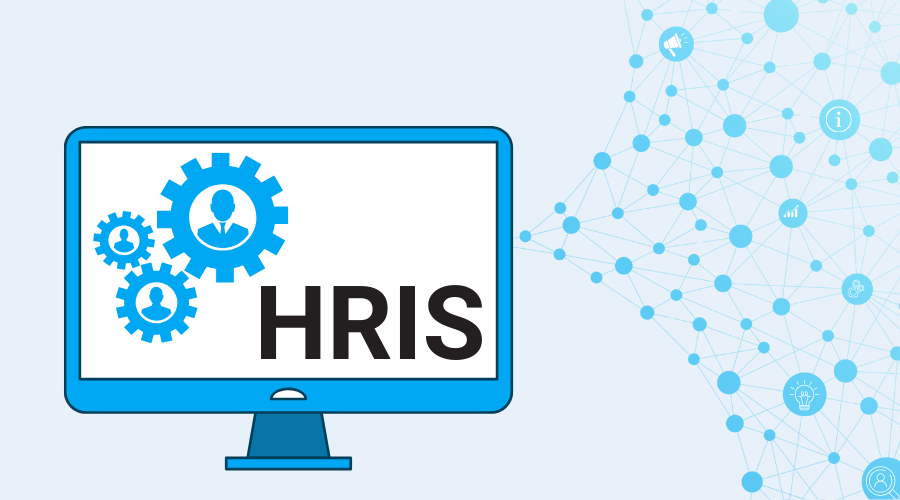Managing HR is no small job. From payroll and onboarding to compliance and performance reviews, there’s always something demanding your time. If you’ve ever felt like you’re drowning in paperwork or jumping between too many systems just to keep things moving, you’re not alone. That’s where HRIS comes in.
Human Resource Information Systems are designed to make HR simpler, more accurate, and a whole lot less stressful. In this guide, we’ll break down what HRIS is, who uses it, the top 10 benefits, and what you should know about providers, costs, and even how it compares to outsourcing HR altogether.
What is HRIS?
HRIS stands for Human Resource Information System. In simple terms, it’s HR software that helps you manage all things people-related in one place. Instead of juggling payroll software, spreadsheets, and manual onboarding checklists, you get a single platform that stores employee data, automates tasks, and gives you easy access to the information you need.
Think of HRIS as the backbone of modern HR. It keeps you organized, compliant, and efficient while also creating a better experience for your employees.
Who uses HRIS?
HRIS is used by businesses of all sizes, from small startups to large global companies. In other words? Basically, any business that has employees.
- Small businesses use HRIS to stay organized without having to hire a big HR team.
- Mid-sized companies rely on it to scale as they grow and keep compliance in check.
- Large organizations use HRIS for advanced features like analytics, performance management, and global workforce tracking.
It’s not just for HR managers either. Employees use it to update personal info, request PTO, or check pay stubs. Executives use it for reporting and workforce planning. In other words, if your business has people, HRIS has a role to play.
Top 10 Benefits of HRIS
So why should you consider HRIS? Let’s take a closer look at the benefits of HRIS.

1. Streamlined HR Tasks
No more juggling multiple systems or spending hours on repetitive admin. HRIS automates payroll, time off tracking, and onboarding tasks so your HR team can focus on people instead of paperwork.
2. Better Compliance
Staying compliant with labor laws and tax regulations is tough when you’re doing it manually. HRIS helps by tracking deadlines, managing employee records securely, and keeping audit trails at your fingertips.
3. Improved Accuracy
When employee data lives in one system, you avoid duplicate entries and mistakes that come from spreadsheets or manual processes. That means fewer errors in payroll and benefits.
4. Cost and Time Savings
Every hour saved on admin is an hour you can spend on strategy. By reducing manual work and cutting down on costly mistakes, HRIS pays for itself over time.
5. Data-Driven Insights
Need to know turnover rates or how much PTO is being taken each quarter? HRIS gives you instant reports so you can make decisions with real data, not guesswork.
6. Better Employee Experience
Employees don’t want to email HR every time they need a pay stub or want to update their address. With self-service portals, they can do it themselves quickly and easily.
7. Smoother Onboarding
A strong first impression matters. HRIS lets you create automated onboarding checklists, collect paperwork digitally, and get new hires set up fast so they feel welcomed from day one.
8. Easier Performance Management
Instead of hunting down review forms or trying to track goals in spreadsheets, HRIS organizes performance reviews and feedback in one place. That makes check-ins more meaningful and less stressful.
9. Scalability as you Grow
Adding more employees doesn’t mean adding more headaches. HRIS scales with your business, whether you’re doubling your team or expanding into new regions.
10. Happier HR Team
At the end of the day, HRIS reduces burnout for your HR staff. By handling the repetitive stuff, it frees them up to focus on building culture, supporting employees, and driving strategy.
Leading HRIS Providers
There are a lot of options out there, but here are some names you’ll run into often:
- Gusto: Great for small to mid-sized businesses that need payroll and benefits in one easy system.
- Zenefits: A user-friendly option that covers core HR, payroll, and onboarding.
- Paycor: Known for its all-in-one HR suite with strong recruiting and performance tools.
- Rippling: Popular with growing companies thanks to its ability to manage both HR and IT.
- Namely: A good fit for mid-sized businesses looking for self-service features and reporting.
- Paycom: Built for businesses that want a single system with robust features from hire to retire.
Average Cost of HRIS
How much will HRIS set you back? It depends on your provider and the features you need, but most systems charge per employee per month.
On average, you can expect to pay $15 to $30 per employee per month. Some providers charge less if you’re small, while larger and more advanced systems can cost more. There may also be setup fees, training costs, or add-on modules that affect the price.
The important thing to remember is cost vs. value. Even though you’re paying monthly fees, the time savings, error reduction, and compliance support often outweigh the expense.
HRIS vs HRO
If you’ve been looking into HR solutions, you’ve probably seen both HRIS and HRO come up. Here’s the difference:
- HRIS is software you use to manage HR in-house. It gives you control, data access, and automation.
- HRO (Human Resource Outsourcing) is when you hand off HR tasks to an outside provider who does the work for you.
A quick comparison:
| Feature | HRIS | HRO |
| Control | You retain system control and data | Limited control; provider manages operations |
| Automation | Automates tasks and is managed internally | Outsourced and managed by a provider |
| Data Access | Immediate access to analytics and HR data | Depends on the provider’s reporting capabilities |
| Cost | Subscription, setup, and training costs | Usually per‑employee or bundled service fees |
| Strategic HR | Enables internal strategic focus | Let’s you offload work, but with less ownership |
So, which is better? If you want to keep control and scale internally, HRIS is the way to go. If you’d rather offload everything to a third party, HRO might be a better fit. Some businesses even use a mix of both.
Final Thoughts on the Benefits of HRIS
If you’re spending too much time on HR admin, it may be time to consider an HRIS. From automating payroll to improving onboarding and boosting employee satisfaction, the benefits of HRIS are hard to ignore. HRIS is more than just software. It’s a tool that helps you build a stronger, more efficient workplace.
Need an HRIS?
Not sure where to start? The good news is there are plenty of HRIS providers designed for businesses of all sizes. At 360Connect, we help you compare top suppliers and find the right fit for your company. Whether you’re looking for payroll support, onboarding tools, or a complete HR platform, we’ll connect you with the best options for your needs.

